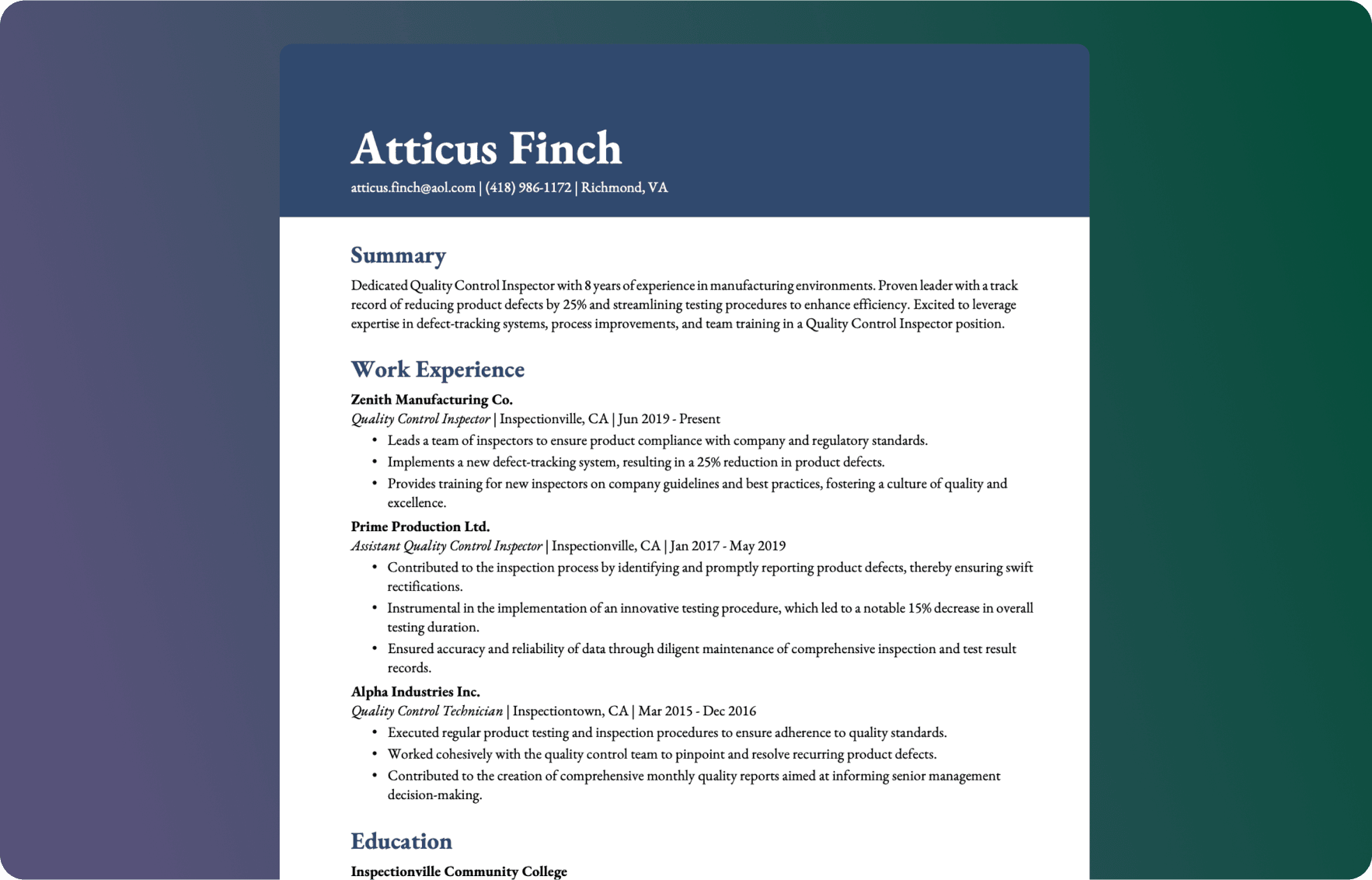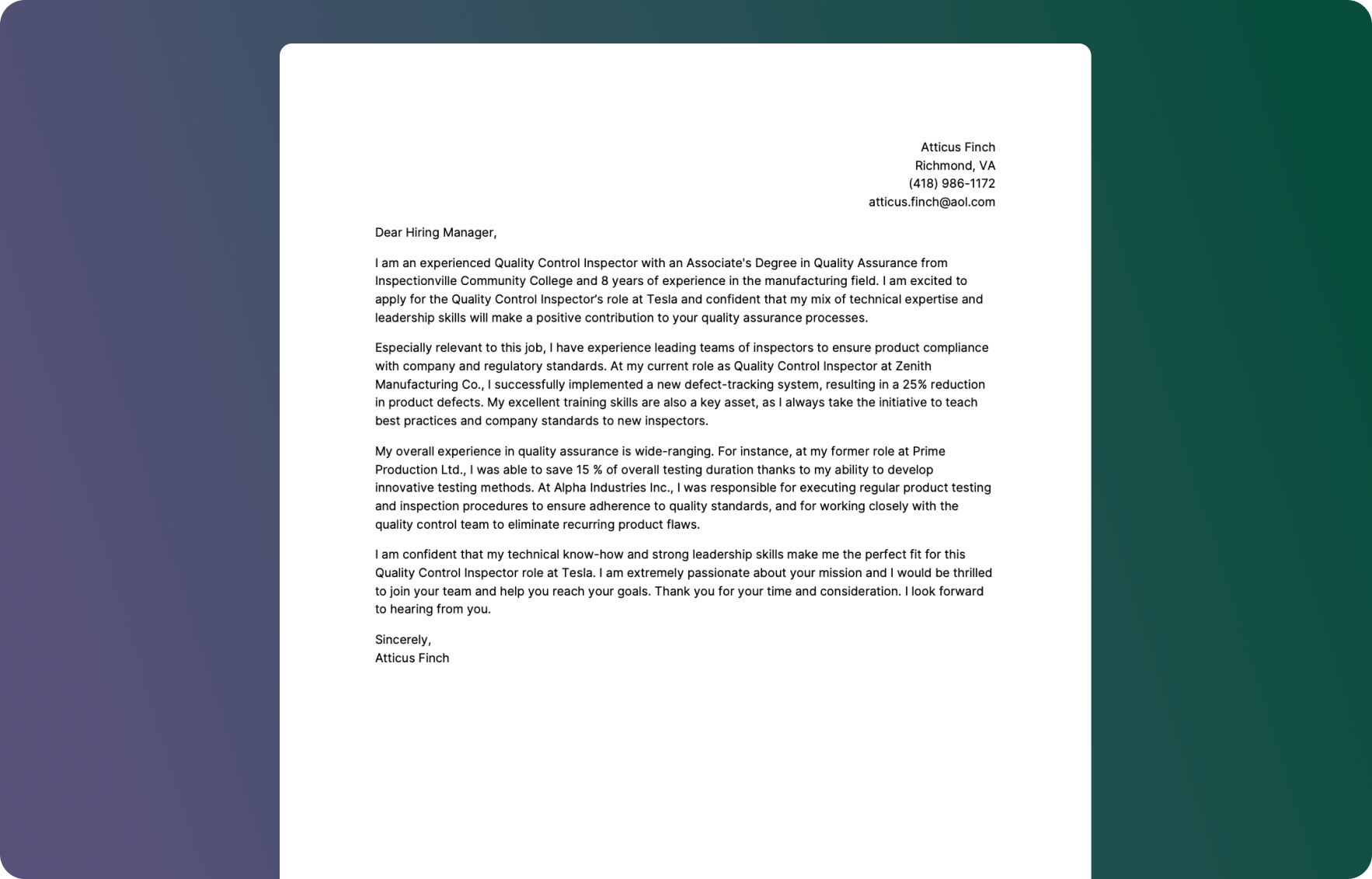Brief overview of the Quality Control Inspector position.
A Quality Control Inspector plays a pivotal role in ensuring that products meet established standards of quality, reliability, and performance. Positioned mainly within manufacturing and production industries, their responsibilities encompass examining materials, goods, or products meticulously to detect defects or deviations. Using various tools and techniques, they conduct tests, measure dimensions, and evaluate the overall functionality of products to ascertain conformance to specifications. As guardians of quality, they not only identify issues but also recommend corrective actions, document findings, and collaborate with teams to instigate improvements. Their keen observation skills and attention to detail directly contribute to the reputation of the company, ensuring that only products meeting the required standards reach the consumer.
What are the skills and attributes that companies are looking for in Quality Control Inspectors?
- When hiring Quality Control Inspectors, employers seek a combination of technical proficiency, communication skills, and analytical thinking due to the job’s crucial role in ensuring product quality. Here are the top 12 skills and traits sought in Quality Control Inspectors:
- Attention to Detail: Ability to detect minor discrepancies or defects that could affect product quality.
- Technical Knowledge: Understanding of the machinery, tools, and equipment used in inspections.
- Analytical Skills: Capacity to assess test results and determine if products meet the set standards.
- Problem-Solving: Ability to identify issues and recommend corrective actions.
- Manual Dexterity: Proficiency in handling tools and samples with precision.
- Mathematical Skills: Capability to make accurate measurements and calculations related to product specifications.
- Communication Skills: Aptitude for conveying findings clearly to production teams and management.
- Computer Proficiency: Skill in using software for data recording, analysis, and report generation.
- Knowledge of Standards: Familiarity with industry and regulatory quality standards and guidelines.
- Team Collaboration: Ability to work cohesively with production teams and other departments to ensure quality.
- Continuous Learning: Willingness to stay updated with the latest inspection methods and industry best practices.
- Time Management: Efficiency in managing multiple tasks and ensuring timely inspections.
Quality Control Inspector - Example Resume

💡 Protip: EarnBetter has a free tool that can create a professional Quality Control Inspector resume for you. It’s free and it takes less than a minute to do - click here to get started today!
What keywords are most important to include in your application for a Quality Control Inspector position?
- When applying for a Quality Control Inspector position, it’s crucial to use keywords that reflect the specific skills and attributes essential for the role. Here are 12 important keywords to consider including in your application and resume:
- Quality Assurance
- Inspection Techniques
- Defect Identification
- Technical Specifications
- Calibration
- Documentation
- ISO Standards
- Corrective Actions
- Statistical Analysis
- Continuous Improvement
- Safety Protocols
- Product Compliance
Quality Control Inspector - Example Cover Letter

💡 Protip: EarnBetter has a free tool that uses AI to customize cover letters for specific jobs. You can get a professional cover letter tailored to a Quality Control Inspector role in less than a minute - click here to get started today!
What types of questions could I expect for a Quality Control Inspector interview?
In a Quality Control Inspector interview, anticipate questions evaluating your capability to interpret standards, handle product batches, communicate effectively with team members, and address complex issues while adhering to company protocols. Here are five potential interview questions for a Quality Control Inspector position, along with guidance and example answers:
- Question: How do you ensure that the tools or equipment you use for inspection are accurate and reliable?
- Guidance: Highlight your knowledge about calibration and routine equipment checks.
- Sample Answer: "Regular calibration of tools and equipment is crucial. I schedule periodic calibration checks and also perform visual inspections before each use to ensure there’s no obvious damage or wear. Documentation of each calibration is also important for traceability."
- Question: Describe a time when you identified a recurring defect in a product. How did you handle it?
- Guidance: Show your problem-solving skills and your ability to collaborate with other departments.
- Sample Answer: "I noticed a consistent alignment issue in one of our products. After documenting several instances, I collaborated with the production team to trace back the root cause. It turned out to be an issue with one of the machines, which was then promptly rectified."
- Question: How do you handle situations when a team member or supervisor disagrees with your quality assessment?
- Emphasize your communication skills, professionalism, and commitment to quality.
- Sample Answer: "Open communication is key. I would present my findings backed by data and the established quality standards. It’s essential to ensure that decisions are based on facts and not opinions. If disagreements persist, I’d seek a review from a third party or senior personnel."
- What role does documentation play in your inspection process?
- Guidance: Discuss the importance of detailed and accurate record-keeping.
- Sample Answer: "Documentation is vital. It provides a historical record of inspections, helps identify patterns or recurring issues, and ensures traceability. Accurate records also support accountability and can be critical during audits or reviews."
- Question: How do you stay updated with the latest quality standards and inspection techniques in your industry?
- Guidance: Highlight your dedication to continuous learning and professional development.
- Sample Answer: "I regularly attend workshops and seminars focused on quality control. Additionally, I’m a member of a few professional quality assurance organizations, which provide updates on industry standards and best practices."
What is the average day in the life of a Quality Control Inspector?
An average day in the life of a Quality Control Inspector begins with a review of the day’s tasks, often starting with a check on any pending tests or inspections from the previous day. The inspector might spend a significant portion of their day on the production floor, examining products, materials, or components to identify defects or deviations from set standards. Utilizing a range of tools and equipment, they conduct specific tests, measure dimensions, and assess overall product functionality. Data collection is a constant, with the inspector meticulously recording their findings, making notes of any anomalies, and comparing results to expected outcomes. Collaboration is also common; the inspector might liaise with production teams to communicate issues or to understand any changes in the manufacturing process that could influence quality. Throughout the day, they might also engage in discussions about corrective measures for identified defects, participate in team meetings focused on quality improvement, and sometimes even train junior staff or peers on best practices. The day typically concludes with final inspections, report preparations, and setting priorities for the subsequent day. Ensuring consistent product quality and safety remains at the forefront of their activities throughout.
What if I want to become a Quality Control Inspector but I don’t have much experience?
If you`.eslintreact/no-unescaped-entitiesre aiming to become a Quality Control Inspector but lack significant experience, it`.eslintreact/no-unescaped-entitiess beneficial to start by seeking relevant educational opportunities or certifications in quality assurance and control. Many technical schools and community colleges offer courses that provide foundational knowledge about quality standards, inspection techniques, and industry-specific protocols. Consider obtaining an entry-level position or internship within a manufacturing or production company to gain hands-on experience and familiarize yourself with the day-to-day operations. While in such roles, proactively learn about the tools, machinery, and quality expectations of the company. Also, leverage transferable skills such as attention to detail, data recording, and analytical thinking. Joining professional organizations related to quality control can provide networking opportunities, workshops, and resources that keep you updated on industry best practices. As you accumulate knowledge and demonstrate dedication, you can progressively transition to a role focused primarily on quality control inspections.